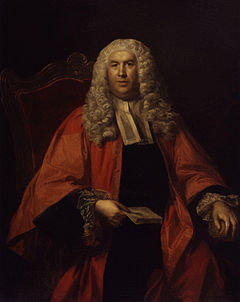William Blackstone
William Blackstone (10 de Julho de 1723 – 14 de Fevereiro de 1780) foi um jurista britânico conhecido por ter escrito os “Comentários sobre as Leis da Inglaterra” (1765-1769), a primeira grande obra da jurisprudência inglesa desde "Institutes" (1628-1644), de Sir Edward Coke.
| William Blackstone |
|---|
 |
- “É melhor dez pessoas culpadas escaparem do que um inocente sofrer.”
- “O principal objetivo da sociedade é proteger os indivíduos no gozo daqueles direitos absolutos, que lhes foram conferidos pelas leis imutáveis da natureza, mas que não poderiam ser preservados em paz sem a assistência mútua e o intercâmbio que é obtido pela instituição de comunidades amigáveis e sociais. Daí resulta que o primeiro e principal fim das leis humanas é manter e regular esses direitos absolutos dos indivíduos.”
- - The principal aim of society is to protect individuals in the enjoyment of those absolute rights, which were vested in them by the immutable laws of nature, but which could not be preserved in peace without that mutual assistance and intercourse which is gained by the institution of friendly and social communities. Hence it follows, that the first and primary end of human laws is to maintain and regulate these absolute rights of individuals.
- - Commentaries on the Laws of England (1765–1769)
- - The principal aim of society is to protect individuals in the enjoyment of those absolute rights, which were vested in them by the immutable laws of nature, but which could not be preserved in peace without that mutual assistance and intercourse which is gained by the institution of friendly and social communities. Hence it follows, that the first and primary end of human laws is to maintain and regulate these absolute rights of individuals.